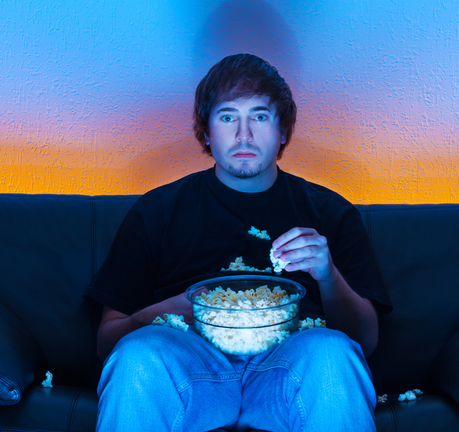HAVE STREAMING SERVICES made food documentaries A Thing.
But whether it is 2017 What health2018 The Gamechangers2021 Seaspiracyor 2024 You are what you eat: a twin experiment - these nutrition documentaries all share similar warning signs as I do as a registered dietitian.
Yes, learning about ways to incorporate a healthy approach to eating is a smart idea. But viewers should be careful about where and from whom they get their information.
As is the case with too many of these films, the proposed "best" way to eat is often influenced by expert bias, incomplete data, and fear-based arguments.
Here are five warning signs I look for when watching a food documentary - and what you should look out for too.
Red Flag #1: The movie seems one-sided
Look, everyone comes with its own biases - and food documentaries are often made to convey a director's perspective or the belief system surrounding a specific topic. There's nothing wrong with that, but if a film just presents An side of an argument it is difficult for viewers to make an informed decision on the topic.
It's important to know who is making and financing the film you're watching, and to be aware of any biases they may have. So before you drastically change your diet after watching any of these movies, do some detective work.
For example The Gamechangers And You are what you eat are partly funded by the Vogt Foundation. The objective of the Vogt Foundation is to promote a plant-based diet and animal welfare. We don't hear about that revelation in the actual documentaries themselves, although the foundation is mentioned in the credits.
In my professional opinion, it is unlikely that a film funded by a foundation that promotes plant-based eating can be unbiased.
Tanja Ivanova/Getty Images
Another example is Kip Andersen, the force behind the popular Netflix documentaries Cowspiracy, SeaspiracyAnd What health, is the founder of AUM Films & Media, "a nonprofit organization focused on making films and media that promote flourishing, compassion and harmony for all life." (The subtext behind "all life" means animals, since Andersen has said he is vegan.)
I will say that as long as that is not the case impossible For someone deeply rooted in the world of animal activism to make a film that is neutral, it's challenging for me as a viewer (and as a dietitian) to believe in a lack of prejudice.
Red flag #2: There are no dissenting experts
Just like digging into who's behind these documentaries, you also need to check the backgrounds of who's in them. (And remember who is not appear therein.)
In You are what you eat the vast majority of experts mentioned identify themselves as activists for vegan or plant-based products, diets and charities.
Miyoko Schinner, who developed Miyoko's Creamery, a company that produces vegan cheese and butter, appears in the film. Just like Don Staniford, an activist who campaigns against salmon farms.

Andriy Onufriyenko / Getty Images
It's not their opinions that are a red flag for me; it's that their opinions are never questioned.
When a film is balanced, experts from all sides present their arguments for and against the subject. In this way, viewers receive all relevant information about a subject, so that they can form their own judgment about it.
Red Flag #3: FEAR
If you watch a nutrition documentary and regularly hear sensational claims, that should be a red flag. A few examples:
- Eating X amount of food is just as bad for us as smoking Y number of cigarettes
- Any consumption of Z food is harmful to your health
- Drinking cow's milk can lower a man's testosterone levels by a shocking amount
Frightening-sounding statements are intended to hold the viewer's interest and spark discussion. The problem is that these terrifying "facts" are rarely based on solid science.
That cow's milk study in which you are quoted The Gamechangers and elsewhere? It was a 2010 study published in the journal Pediatrics International. In the study, scientists followed 18 people (seven men, six children and five women) who drank the milk of pregnant cows. They found that milk temporarily reduced testosterone secretion - and not total testosterone.
And note that this result was found in only seven men, an incredibly small sample size.
In another example, an expert in You are what you eat tells us that livestock farming emits more greenhouse gases than the entire transport sector. This claim goes unchallenged in the film, but is easily refuted with a quick search on the EPA website.
If a statement sounds too shocking to be true, it probably isn't.
Red Flag No. 4: It fuels doubt in the government and/or the food supplyIn many food documentaries, the tone, music and images are presented in a way that calls into question where our food comes from. To me, this is a tactic to convince viewers to adapt their diet to that of the filmmaker.
In You are what you eat we see images of pig feces being sprayed across fields and environmentalists telling us that all farmed fish are diseased. This paints a picture that animal food is dirty and is produced without adequate government supervision.

Ironically (or perhaps not) there is no focus at all on the mass production of plant-based foods, which theoretically should be explored in a fair comparison.
Food production for an entire country poses a food safety challenge. The American food system is actually safer than ever before, especially since the Food Safety Modernization Act was signed into law - and continues to be regularly updated to help keep consumers safe.
Is it perfect? No. Is it malicious? I do not think so.
Red Flag #5: It conducts its own 'research'
It's one thing to misinterpret research, but it's another to mistake anecdotal evidence or staged experiments for actual research.
Take the famous example The Gamechangers, in which athletes eat a high-fat, animal-based meal or a vegan meal, then have their blood drawn two hours later. The film focuses on the fact that the athletes who consumed the animal meal appear to have cloudy, fatty blood plasma. The athletes who ate the vegan meal appear to have normal-looking blood.
The difference is shown as "proof" that a vegan diet is healthier, but in reality, having fat in our blood after a high-fat meal may seem shocking, but it is normal. This is how fat reaches our cells.
Claims must always be supported by research, which rarely happens in documentaries. It's difficult to fact-check a movie in its entirety, but there are sometimes indications that something is being done for show rather than actual evidence.
The bottom line: A healthy diet includes a variety of all foods. If you choose to eat a certain way, please make that choice based on facts and not fear. Remember, food documentaries are notorious for being sensational and short on facts.

